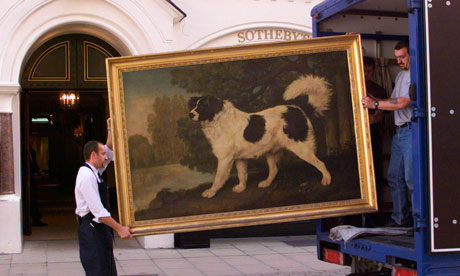
They are strong, loyal and have sweet tempers – and they may also share some characteristics with golfer Tiger Woods and footballers Paul Gascoigne and Roy Keane.
Scientists are appealing for owners of Newfoundland dogs to help prevent cruciate ligament disease in canines and, maybe, pave the way for a better understanding of the common knee injury that has interrupted the careers of sports stars.
Researchers at Liverpool university are exploring whether genetic factors make some animals – and possibly humans – more prone to the condition and more likely to suffer a ligament rupture, which often happens without physical contact with an opponent.
Gascoigne was out of the game for a year after his infamous tackle on Gary Charles in the 1991 Spurs-Nottingham Forest FA Cup final, while Keane snapped his ligament attempting to challenge Alf-Inge Haaland of Leeds in 1997, prompting one of football's savage ripostes when he set out to cripple Haaland more than three years later. Woods's first long absence from the golf course was down to his knee, rather than scandal over his private life. Others succumbing to the injury include Ruud van Nistelrooy, Michael Owen, Joe Cole, cricketer Simon Jones and rugby player Lawrence Dallaglio.
The Liverpool study team is looking for Newfie dogs of any age which have had the disease and older dogs which have not, sending kits to their owners to take saliva samples for DNA comparison, or checking blood samples taken by vets.
Arabella Baird, from Liverpool university's veterinary department and a member of its musculoskeletal research group, said: "If we can identify the genes that are involved in this debilitating condition, we can help develop a test to detect it early on. This information will be significant in influencing breeding strategies to reduce the risk of the disease being passed on down the generations.
"This condition is also common in humans, particularly athletes, so if we can identify the genes in dogs, we may also be closer to identifying them in humans."
Baird added: "The disease in humans tends to occur when stress is put on the ligament, but there have been some preliminary findings that suggest there is a genetic component that could predispose humans to the condition.
"Research also shows that females are more predisposed to the disease than their male counterparts, although more study is needed to understand if genetics or hormones play a part in this. Our project will be looking at many genes and the results of our study in dogs will be comparative to the human medical field."
Cruciate ligament disease was one of many rheumatology/orthopaedic conditions that occurred in dogs and which could exist in an identical or similar form in humans, said Baird.

